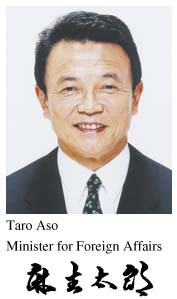Japan's Official Development Assistance White Paper 2006
Main Text > FORWORD
FOREWORD
Since its beginnings in 1954, Japan's Official Development Assistance (ODA) has been contributing to solving the evolving challenges that Japan and the international community have faced. Actively promoting development assistance as a means of its foreign policy, Japan has been supporting the world's peace and stability through the provision of assistance for economic development and humanitarian issues of developing countries. Japan has also in this way engaged in solving global-scale issues.
Sympathy is not merely for others' sake, as I mentioned in a speech at the beginning of this year. Through its development assistance, Japan supports the self-help efforts of its local partners for their development and stability. This in turn will be linked to the stability and prosperity of Japan, a link that must be achieved. It is also important to convey our experience and expertise from the post-war development and our diligent working style by means of joining the local people in their hard work to achieve goals. In a new international environment that sees a surge of emerging countries, in order to ensure the economic prosperity of Japan it is furthermore essential to effectively use ODA programs for purposes such as improving the trade and investment environment, promoting economic partnerships, and securing resources and energy. Given these points of view, it is Japan's responsibility in the international community to increase its ODA volume and reinforce its commitment to achieving the international targets of the Millennium Development Goals (MDGs) and to assist efforts for peace and reconstruction in countries such as Iraq and Afghanistan. In this way, ODA is facing increasingly diverse and important roles that it must play.
These commitments require solid-built strategies. Making ODA effective and efficient is also important. To these ends, 2006 saw a number of reforms. First in April, the Overseas Economic Cooperation Council was established under the Cabinet Office. The council is chaired by the Prime Minister and is to discuss the basic strategies of overseas economic cooperation. After that in August, the Ministry of Foreign Affairs (MOFA) set up an International Cooperation Bureau, aiming to reinforce the ministry's planning, organizing, and adjusting capabilities with regard to economic cooperation. In November the Diet revised the Law for Japan International Cooperation Agency (JICA). The revised law stipulated that JICA be the sole organization to implement the three modes of cooperation: yen-loans, technical cooperation, and grant aid. This series of reforms has helped the Government to enhance strategic aspects of economic cooperation and shape a system that organically links each method of cooperation for its efficient and effective implementation.
This year's ODA White Paper traces back the roles played by Japan's assistance for the peace and development of the international community, as well as for helping to ensure the security and prosperity of Japan. Based on that, the White Paper carries special features looking into what new missions are expected of ODA in today's international environment, as well as into the reform that is designed for ODA to pursue such a wide range of missions. The section on disbursements reports the results of ODA with reference to the latest cases of activities. It is my sincere wish that this book will help deepen your understanding of Japan's development assistance and enhance your support for our endeavors.
December 2006


 Next Page
Next Page